- Home
- S. Hussain Zaidi
My Name is Abu Salem
My Name is Abu Salem Read online
S. Hussain Zaidi
MY NAME IS ABU SALEM
Contents
About the Author
By the Same Author
Dedication
Introduction and Acknowledgements
Prologue
1. Barrister’s Boy
2. Salem and Sameera
3. The First Brush
4. Salem and Sanjay
5. The Big D
6. Scurrying for Cover
7. Despair in Dubai
8. First Blood
9. Salem’s Killing Machines
10. Salem Imports Rent-a-Killer
11. Taming Bollywood
12. Conspiracy in Dubai
13. An Execution, a Warning
14. Extradition Embarrassment
15. The Fallout
16. Duggal’s Doll
17. The Don’s Darling
18. A Starlet’s Rise
19. Salem in South Africa
20. Sameera’s Souten
21. Salem under Surveillance
22. Caught Out in Lisbon
23. The Lisbon Incarceration
24. Love and Longing in Lisbon
25. The Journey Back
26. The New Jersey Connection
27. Sameera Lashes Out
28. Monica the Turncoat
29. Salem’s Sojourn to Sarai Mir
30. Salem’s One-Woman Army
31. Surviving Reprisals
Epilogue: A Don-in-Waiting
A Note on Sources
Follow Penguin
Copyright
PENGUIN BOOKS
MY NAME IS ABU SALEM
S. Hussain Zaidi is a Mumbai-based journalist, a veteran of investigative, crime and terror reporting. He has worked for the Asian Age, Mumbai Mirror, Mid-Day and Indian Express. His previous books include bestsellers such as Black Friday, Dongri to Dubai, Mafia Queens of Mumbai and Byculla to Bangkok. Black Friday and Dongri to Dubai have been adapted into the Bollywood films Black Friday and Shootout at Wadala respectively. He lives with his family in Mumbai.
Also by the same author
Mafia Queens of Mumbai: Stories of Women from the Ganglands (with Jane Borges)
Dongri to Dubai: Six Decades of the Mumbai Mafia
Headley and I
Byculla to Bangkok
For
Vikram the great Chandra,
My mentor, my school of storytelling and writing, my guru, my friend
Introduction and Acknowledgements
My Name Is Abu Salem is the third book in my mafia trilogy, after Dongri to Dubai and Byculla to Bangkok. Though the actual research took four years, this has been a work-in-progress since 5 August 1997—the day I first spoke to Abu Salem. He was holed up in Dubai then; the very day four of his men were arrested in Bandra for planning an attack on the then reigning movie czar Subhash Ghai. It was also exactly a week before the gruesome murder of music magnate Gulshan Kumar.
It has been over seventeen years since, and I have subsequently met Salem on several occasions. There is a deep-seated mutual dislike between us. He cannot comprehend why I’m not in awe of him and why I don’t spare my acerbic pen while writing about him. Members of the mafia often live under the illusion that they are a much-misunderstood lot and that they absolutely do not deserve the firestorm of criticism directed at them. For instance, Salem believes he is very good-looking and that he is a good human being.
For me, Salem is the embodiment of all that is vicious about the mafia—unchecked power and random killings. But even ganglords and dons, despite their sadistic streaks, follow a certain unwritten code. Salem breached all of them. For instance, after killing builder Pradeep Jain, he gloated about it to his victim’s widow on the thirteenth day of rituals for her deceased husband. The woman had a nervous breakdown.
In a reporting career spanning nineteen years, I’d come across all kinds of maniacs, but never one to match Salem. Incidentally, he belongs to a respectable family, with highly principled parents.
As a journalist and writer, I’m not supposed to like or dislike my subject. Being objective in writing about such people is akin to a surgeon’s code to perform a surgery without allowing his feelings for or against the person to get in the way. In that sense, Salem was a complex, intricate and difficult subject to profile.
However, after over four years of steady research, I realized I would need more time to finish my own investigation as several of Salem’s trials were nearing conclusion. But time was a luxury I did not have.
I profusely thank my publishers at Penguin and chief editor Chiki Sarkar. Her patience and calm pursuit ensured I finished the book as per my standards of satisfaction. Chiki gave me sufficient latitude and liberty to wrap up the book in the manner that I desired. I would also like to thank my copy editor Shanuj and the cover designer Aashim Raj.
An officer who knows Mumbai’s criminals and their global misadventures, former New Delhi police commissioner Neeraj Kumar, came to my rescue repeatedly. Mr Kumar had been the joint director of CBI when Salem was in the United States. It was he who nudged the snooty FBI to go after Salem. He was immensely helpful and remained generous with his time, with no airs about his stature and always keen to help me out. Shukriya, karam, meherbani, I am so grateful to have you as my friend, Mr Kumar.
Encounter specialist and Crime Branch cop Pradeep Sharma’s resourcefulness and ground-level intelligence gave the book that much-needed boost. Sharma introduced me to the slimiest informants and the most well-connected underworld players hidden in the movie industry. Whenever I hit a dead end in my research, Sharma opened the doors of access to me and ensured that I managed to complete my investigation. My profound gratitude and debt, Janab Sharma Saheb.
Bollywood thrives on a conspiracy of silence. But film-maker Sanjay Gupta, himself a victim of Salem’s nefarious designs, magnanimously spent hours describing Salem’s vicelike grip on the film world. It was Sanjay’s valuable insights that threw light on the plight of the film industry when Abu Salem was calling the shots.
My former colleague Jigna Vora, who was associated with the project since its inception but could not continue because of legal ramifications, displayed exemplary investigative skills and reporting chutzpah in providing information on Salem. Jigna also procured several documents and legal papers for the book. Thank you, Jigna.
After the police and journalists, lawyers were the next big link in helping me finish this project. And the biggest help among them came from a lawyer with tremendous diligence and patience, advocate Saba Kureshi. I met her only a couple of months ago when I was close to winding up the book and she helped me understand the complexities of Salem’s extradition and its subsequent cancellation by the Portuguese Supreme Court. Saba patiently and painstakingly explained the legal essentials of the case. I would have been accused of several blunders had it not been for her contribution. Thank you, Saba Kureshi.
The other lawyer who helped me was Sudip Pasbola, who paved the way for my meetings with Salem in the sessions court during lunch breaks.
Three journalism students pitched in with their devotion and diligence. Yesha Kotak, Aakash Jain and Bilal Siddiqui transcribed voluminous documents to make things easier for me. Yesha also translated difficult court papers from Hindi and Marathi into English. These young friends of mine are really industrious, efficient and an extremely hard-working lot. I am so inspired by their selfless service and legwork. Thank you, Yesha, Aakash and Bilal, it’s unimaginable to work without the three of you.
While writing this book I deliberately decided to avoid seeking help from any journalist friends. However, I had to break this vow to seek guidance from Sheela Rawal. Sheela is editor of investigations at Star News and one of the
most intrepid investigative journalists in the country. She is the only one who managed to trace Sameera Jumani, Salem’s wife, in the US and to speak to her for six hours. Since this feat could not have been replicated, I sought Sheela’s help in using the interview and other background details on Sameera. Sheela quite generously and unhesitatingly helped me with information, a rare trait among Indian journalists. My in-depth thanks, Sheela.
My thanks will not be complete until I mention friends and contacts who gave me their valuable time during my research, legwork and investigation in Dubai. The Gulf capital is still an underworld hub where gangsters spend their lives behind a thin veneer of respectability but have not entirely recanted from their murky past. They were quite helpful and open while talking about Salem. The man who knew him best and feels most betrayed is Malik. He gave me deep insights into Salem’s character. Others spoke to me only when they swore me to confidentiality.
My protégé and pupil Rayyan Rizvi, who quit journalism when I did and relocated to Dubai, deserves special mention. Rayyan helped with the research in Dubai. For an entire week, he kept aside all his work commitments to become my driver, guide, researcher, interviewer and man Friday. I love you, Rayyan. You are fantabulous.
Prince Reza Iqbal Mirza of Angoori Bagh, Lucknow, a descendant of the royal family in Lucknow, now settled in Dubai, was enterprising and magnanimous with his contribution to the book. Prince Reza was my 2 a.m. friend and travelled with me to little-known nooks and crannies of Dubai. The prince put his entire office staff at my disposal for admin and paperwork, also lending me his senior assistants for transcriptions.
Zahoor Haider Mirza was meticulous in preparing notes and diligent in the transcription of several interviews that I conducted with various Salem aides in Dubai. Despite his hermit-like regimen of sleeping at 9 p.m. every day, the man graciously burnt the midnight oil for me, poring over his laptop in the wee hours with bleary eyes. Zahoor’s accurate and timely notes were of great help.
Zia Rizvi and his wife, Fahmida, of Sharjah also helped immensely in my quest to get the facts right. Thank you, Zia Bhai and Fahmida Aapa.
Lastly, I have to mention that this book would not have been completed without Karan Pradhan, my young colleague since my days in the Asian Age. Karan was associated with this book since the first word was written, and devoted several days and nights to ensure that this turned out to be an engrossing read. He was superb as a researcher, analyst and compiler of facts. Had it not been for him, this story could not have been told in the form and narrative as it is in your hands. Karan was indefatigable while converting the book into several formats, from first-person to third-person and then through other narrative styles as the story unfolded.
My sincere thanks also goes out to Kavitha Iyer, my former colleague from the Indian Express, who despite her prior commitments browsed through the final draft for any errors and gave her blunt advice about each chapter. It was her fine editing that has enhanced the reading pleasure of the book.
Supreme and most profound gratitude is reserved for my readers. On second thoughts, I can never thank you enough, my readers, who motivated me during the darkest hours to keep writing even when I felt fatigued, demoralized and down. It was your inspiration and appreciation that kept me on my toes. I am humbled by your encouragement.
Prologue
‘I can tell you the complete story of Abu Salem as no one else can. He has been my brother and partner in crime since childhood,’ said the baritone voice reluctantly over the phone.
My months of research on Abu Salem had hit a dead end. Despite poring through numerous documents and tracking every available shred of information on Mumbai’s meanest mobster, I was no closer to unravelling the mystery of the man himself. I needed someone close to him.
The man on the phone said I had to come to see him in Dubai if I wanted to meet him. Dubai, during Christmas? In my desperation, I might have been willing to undertake a mission to Mars. But I was not sure if it was wise or even safe to meet a stranger alone and in a foreign country.
The Central Bureau of Investigation (CBI) and the Mumbai Police had given me huge dossiers of information on Salem, but nothing could beat the knowledge of a man who had grown up with Salem from the time he was barely old enough to walk, leave alone wield a gun. It was too much to resist. And so I boarded my Emirates flight to Dubai.
Salem’s life is a study in paradox. He was unique among the Mumbai mafiosi in a number of ways. Born in the village of Azamgarh in Uttar Pradesh, Salem single-handedly rose to become the nemesis of Bollywood bosses and construction czars. No other don’s name instilled as much fear in the hearts of the film fraternity as his. He did not merely terrorize film personalities; he extorted from them, had some of them killed, and along the way also helped some strugglers become superstars. You could call him the don of Bollywood.
A middle-school dropout, Salem managed his smuggling business with remarkable acumen, and made millions. A street ruffian, he also had the heart of a Casanova and was married numerous times, including a whirlwind romance and marriage with a film actress. The man who came to Mumbai with barely Rs 100, now had over Rs 5000 crore worth of property in and around Mumbai. The man who used to ogle at photographs of film heroines in his village had been able to sleep with some of the loveliest ladies in the industry.
Working in a world where taking revenge was a part of the job description, Salem never once spoke or plotted against his old boss Anis Ibrahim even after he bitterly parted ways with the D-Company. What’s more, despite being such a fearsome terror, Salem was also a soft-spoken and well-mannered man. It was this tapestry of contrasts that pulled me towards his story.
The glitzy emirate of Dubai may be known as home to the world’s tallest building (Burj Khalifa), tallest hotel (JW Marriott Marquis) and the largest man-made island (Palm Jumeirah), but for me it is most famous (or infamous) for being a safe haven for the Mumbai mafia. In the early eighties, Dubai was the easiest foreign place for Indians to access. Anyone could get there in two and a half hours, with a visa on arrival for Rs 5000. Whenever the Mumbai Police turned the heat on the gangsters, they would run off to the Arab capital. For less than Rs 20,000 which included airfare and visa, they could shun the Mumbai jails and blend in with the many South Asians who worked in the emirate. To make matters more convenient, Dubai had no extradition treaty with the Indian government during this time; so once a criminal reached this haven, he was safe from the Indian government. The trend that was started by Dawood and his men in the early eighties continued till the late nineties.
Many of the accused in the 1993 Mumbai serial blasts and other major crimes continue to live there and even own several properties in the island capital. Despite Dawood Ibrahim’s relocation to Pakistan, Abu Salem’s extradition to India and Chhota Rajan’s vanishing act, the city still stinks of mafia connections and hideouts. Iqbal Mirchi’s Imperial Suites and Sharad Shetty’s Ramee Guestline hotels are doing well. Both Mirchi and Shetty were Dawood’s confidants when they were alive.
As I landed in Dubai, I realized it was one of the worst seasons to visit. The UAE government was planning the world’s biggest pyrotechnics display which would shatter the previous record by over 400,000 fireworks. Tourists were flocking to the country in droves. In an unrelated development, my Christmas meeting had been shifted to New Year’s Eve. Just my luck. The whole city went berserk on 31 December.
The venue for the dinner was to be Al Ibrahimi, a Pakistani restaurant near Deira Market metro station. Al Ibrahimi’s buffet was regarded as one of the best in Dubai. Delicious tandoori fish, the juiciest nuggets of chicken marinated in yogurt and garlic, a mutton rogan josh that was par excellence, several other Pakistani delicacies and the divine dessert of Umm-e Ali were just some of the treats on offer at the buffet. As I waited, alluring aromas wafting around, I received a call and was asked to come instead to Jumeirah Beach. I protested that the traffic was chock-a-block and that it would be impossible for me to get there
but the man insisted. He was afraid he might be spotted, so he could not afford to be anywhere near Al Ibrahimi.
Following a brief drive through the gridlocked streets, my driver gave up his efforts to drive towards Jumeirah. ‘The Dubai government wants to break the record held by Kuwait’s fireworks display last year,’ he said in exasperation. The sheer scale of Dubai’s fireworks display was staggering—it was an incredible show of extravagance and opulence. In six minutes, over half a million fireworks would explode, fizz, twinkle and scream across Dubai’s skies.
Hosted by various five-star hotels on the Palm Jumeirah as well as by downtown Dubai’s famous Burj Al-Arab hotel and the Burj Khalifa, the midnight fireworks extravaganza was to be split into two parts. First, an intense six-minute display across the Palm Jumeirah and at the 2717-foot Burj Khalifa hoped to seal the world record. This was to be followed by a fifteen-minute display along a one-kilometre stretch of Jumeirah Beach. The present record holder—Kuwait—let off an astonishing 77,282 fireworks over the course of an hour in 2012.
The driver parked my rented car on the side of the road and I began to walk towards the Jumeirah. It seemed quite an arduous task due to numerous security cordons, traffic and the multitude of people. As I began walking I got a call again and was informed of the new venue for our meeting. I was to wait on the highway just across the street from the Burj Khalifa and he would meet me there.
I turned back and re-entered the car and we headed for the highway. The crowd here was relatively thinner and less frenzied but the celebrations were just as splendid. Why had he chosen such a day and time to meet me and tell the story of Salem? I was beginning to feel tired, sleepy and frustrated.
As I waited at the rendezvous point, I felt a tap on my shoulder. I turned to see a nondescript man of medium build, balding and well dressed. On the highway, where the only thing I could see in the dark sky was fireworks, he was sporting sunglasses to hide his face. He did not want me to see his face or look into his eyes.

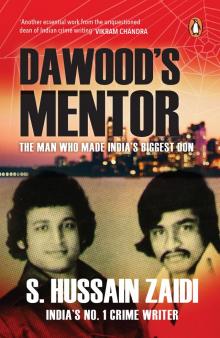 Dawood's Mentor
Dawood's Mentor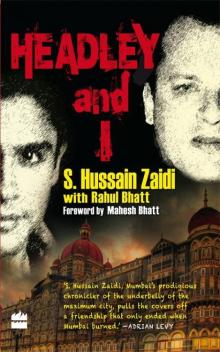 HEADLEY AND I
HEADLEY AND I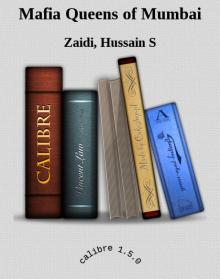 Mafia Queens of Mumbai
Mafia Queens of Mumbai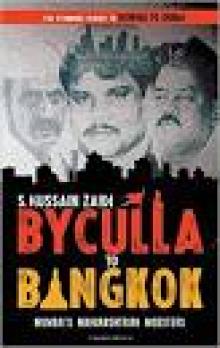 Byculla to Bangkok
Byculla to Bangkok Black Friday
Black Friday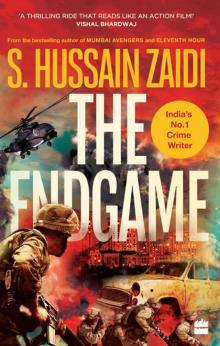 The Endgame
The Endgame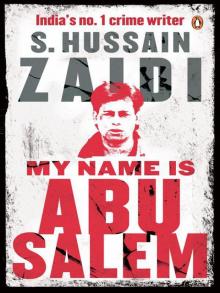 My Name is Abu Salem
My Name is Abu Salem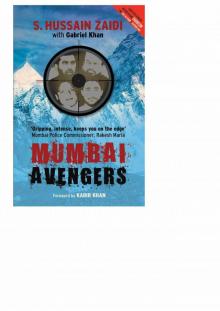 Mumbai Avengers
Mumbai Avengers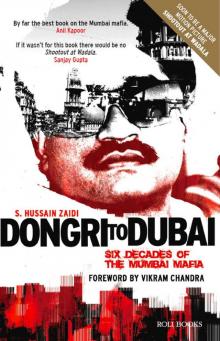 Dongri to Dubai - Six Decades of the Mumbai Mafia
Dongri to Dubai - Six Decades of the Mumbai Mafia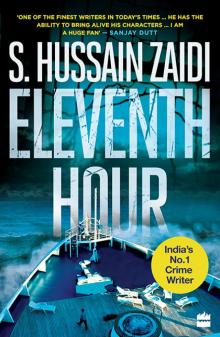 Eleventh Hour
Eleventh Hour